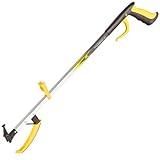Key Takeaways For Understanding When an Elderly Person Should Stop Living Alone
Health and Well-being Priority: When deciding if an elderly person should stop living alone, prioritize their health and well-being. Exploring assisted living options becomes crucial if concerns arise about managing prescriptions, preparing meals, or daily tasks.
Combatting Isolation: Recognize the impact of social activities on mental and physical health. Assisted living can benefit seniors facing isolation or limited social connections, providing a supportive environment for engagement.
Support and Emergency Assistance: Access to support is vital. If an older person struggles to seek assistance in emergencies, considering assisted living may be the best choice, ensuring they have the help they need when required.
Top Mobility Aids
As we age, our ability to live independently may change. For elderly individuals, the decision to stop living alone can be difficult and complex. In this blog post, we will explore the factors to consider when determining if an older adult should stop living alone, as well as options for assisted living and ways to maintain independence.
Factors to Consider
When deciding whether or not an older adult should continue to live alone, the following considerations should be made:
- A senior citizen’s health and well-being should always come first when making decisions about their care. If there are worries about someone’s capacity to manage prescriptions, make meals, or perform daily duties, it may be time to explore assisted living as an option.
- Participation in social activities: Isolation may harm an aged person’s mental and physical health. Assisted living might be a beneficial choice for someone who struggles with feelings of isolation or has few opportunities for social connection.
- Access to Support: It is also crucial for older people to have support and help whenever they want it. Assisted living may be the best choice for a person who cannot call for assistance in an emergency.
Assisted Living Options
If an older person has to quit living alone, there are several different choices available for assisted living that they might consider:
- Assisted Living Facilities are residential communities that provide residents with a mix of accommodation, personal care, and medical services in a social environment.
- Adult daycare centres are open during the day and provide senior citizens with a place to spend the day in a secure and stimulating atmosphere; at night, these persons are free to return home.
- In-Home Care: Services that support everyday activities, such as food preparation, transportation, and personal care, are called in-home care. These services are provided to the client in their own home.
Maintaining Independence
Even if the older adult has to quit living on their own, there are still plenty of methods for them to keep their independence and autonomy:
- Encourage independence: The design of assistive living alternatives should encourage persons’ independence and give them as many opportunities as possible to care for themselves.
- Encourage the older person to have a voice in their daily routine, including the meals they eat and the activities they participate in.
- Promote chances for sociability and engagement with others and encourage people to take advantage of such possibilities.
Summary Of “When Should An Elderly Person Stop Living Alone”
In conclusion, determining whether an older adult should continue to live alone may be a tough and complicated process. By exploring assisted living options such as assisted living facilities, adult day care centres, and in-home care, you can ensure that the older adult has the support they require while allowing them to maintain their independence and autonomy. Health and safety, socialisation, and access to support are all important aspects to consider when selecting an assisted living option.
Top Mobility Aids
Related Elderly Care and Independent Living Articles
- Tips to Help the Elderly Stay Independent – Practical advice for maintaining independence in old age.
- Dementia Tips for Carers – Helpful tips for carers of elderly individuals with dementia.
- Social Care – Learn about different social care options available to elderly individuals.
- Living with Osteoporosis: How to Cope Better with It – Supportive tips for managing health and well-being in later life.












